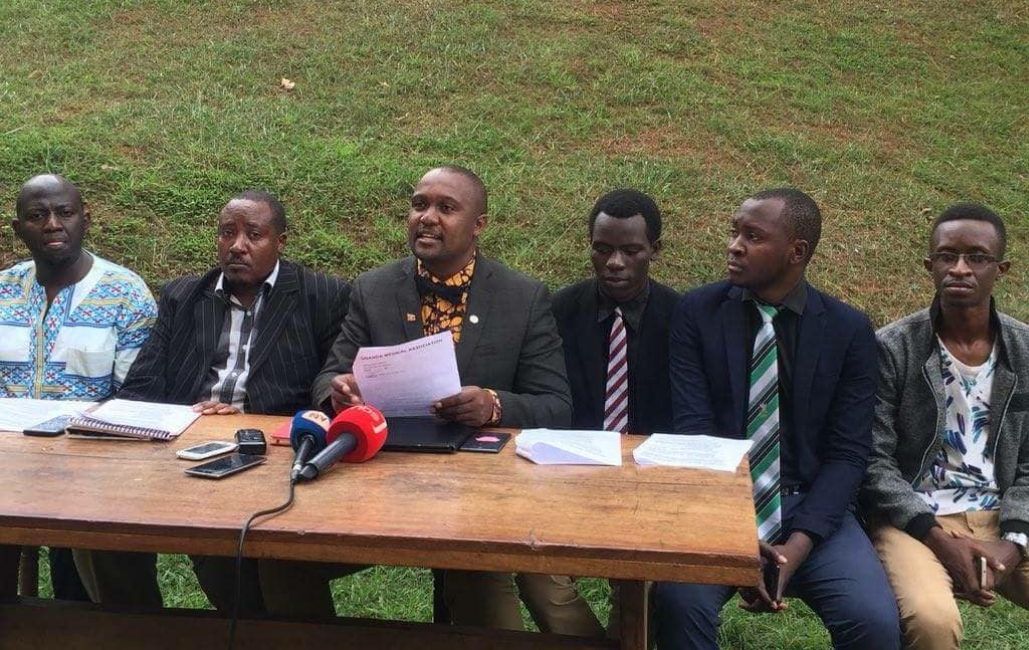The Uganda Medical Association (UMA) has questioned the capacity of the military to offer the required medical care required by detained singer and legislator, Robert Kyagulanyi (Bobi Wine) saying it is highly unlikely that the UPDF have super specialized medical personnel.
On Friday, lawyers of Bobi Wine wrote to Uganda Human Rights Commission asking that the rights watchdog pushes for the immediate transfer of Bobi Wine to a medical facility so that his deteriorating health can be properly managed.
Several journalists yesterday published reports that Medics who accessed the MP say he sustained a damaged kidney and he is experiencing excruciating pain in the hip and head yet no scan or xray examination has been conducted. We were unable to independently verify this as nobody else apart from Bobi’s wife, brother and his lawyer Erias Lukwago is known to have visited the singer at Makindye barracks.
While the UPDF Spokesperson, Brig Richard Karemire earlier this week stated that the army would ensure Bobi Wine receives “adequate medical attention”, the Association that unites medics in Uganda has punched holes in this assurance.
“Honourable Kyagulanyi urgently requires highly specialized treatment outside the confines of the military walls where it is uncertain if such skills exist,” Dr Ekwaro Obuku, the President of the Uganda Medical Association said at a news conference in Mulago hospital on Sunday.
“The colleagues we know who have these specialized skills are practicing in the private sector, in the university in Mulago here. We don’t know any who is practicing in Mbuya. We dont think they are there. Unless they are Chinese or Cubans,” Dr Obuku added.
He said that the Association registers such specialists and would therefore know if any of them were working with the military.
The medics’ body is asking government, particularly the military and President Yoweri Museveni to give them clearance to examine and offer specialized medical care to the detained MP.
As such a team of 16 medical specialists has been put together to execute the urgent service at no cost, said Dr Obuku.
“We have constituted a team of highly super specialists on standby, particularly for Hon Kyagulanyi because he is the only urgent case we know. But if there are other victims of torture in custody, we will attend to them,” he said.
The team comprises of nephrologists, cardiologists, toxicologists/pathologists, gastroenterologists, anesthesiologists, trauma surgeons and neuro surgeons with the highest training.
“We are concerned why his pictures are not available. We think that he is terribly injured. The descriptions of his lawyers and wife are suggestive of someone who is severely injured. Therefore we have trauma surgeons on standby”.
“What is important now is to save his life. We can deal with the rest later. Otherwise, the consequences of torture go beyond the individual. It affects society, family and it’s bad publicity for Uganda,” added Dr Obuku.
He said that in the event that the MP’s situation warrants evacuation for foreign medical care, UMA is in close contact with medics in the diaspora.
“We are more than ready. Only waiting for clearance from the state. We implore the Commander in Chief to give that access to have the best medical care accorded to the Hon Kyagulanyi”.
The Association condemned the continued torture of suspects in custody which they say goes against the World Medical Association policy against torture as well as Article 14 of the UN Convention against torture of 1984.
“We are very concerned about the alleged use of torture by Ugandan security officers on citizens,” Dr Obuku said making reference to MPs Robert Kyagulanyi and Francis Zaake (Mityana municipality).
He said the medics’ condemnation is in line with the reaffirmation by the World Medical Association’s stand against of all forms of torture during its 64th General Assembly in Brazil in 2013.
Dr James Kayiwa from the Uganda Physicians Association said that the severe injuries sustained by Bobi Wine can easily get complicated with likely consequence of liver complications, kidney failure, deterioration in brain functioning from internal bleeding and other traumatic effects.
“We know that victims of any torture suffer what we call Post Traumatic Stress Disorder and that has the possibility of affecting the way you think and act. That’s a long term effect,” he said.











